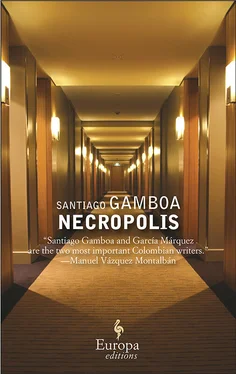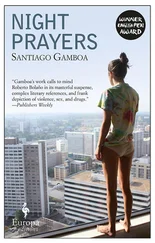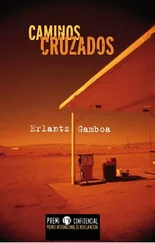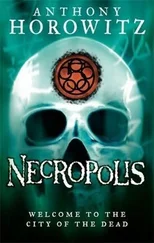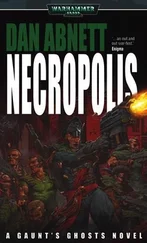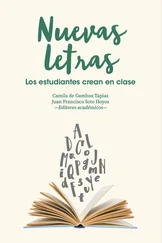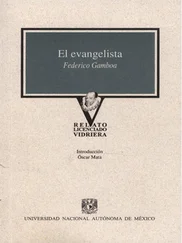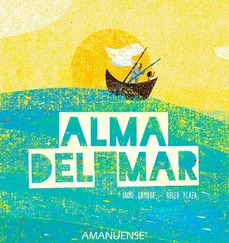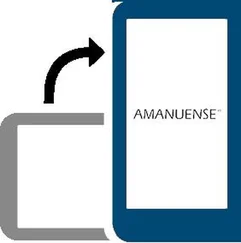I found myself interrupting him: it wasn’t a murder, Mr. Lottmann, I thought that too, at first, but now I’m sure Maturana committed suicide. He was very sick, and he also felt guilty for a whole series of things he did in the past and his relationship with the Ministry. It was a suicide, believe me.
Lottmann looked at me in surprise, and said, ah, my friend, obviously as a writer you weren’t going to let such a story get away. . I see you’ve been doing some research, am I wrong in thinking you’ve been making notes on the subject with a view to a future book? I was not sure what to say, but I nodded: yes, it’s possible I will do one, I don’t know yet, but I have been making notes and thinking a lot about the subject.
They all looked at me, waiting for me to say more. Fortunately, Ebenezer Lottmann spoke again: well, if you write the book, I’ll be more than happy to read it, my friend. I thanked him. Then he added: it would also be interesting to find that book Maturana mentioned, what was it called again? I told him the title, Encounters with Amazingly Normal People. Lottmann took out a notebook and asked me to repeat it; thank you, my friend, I’ll ask my office to find a copy so we can get some idea of it, now that the author has died it could be a real hit, I can see it now, I think I’ll buy the rights anyway, you never know.
I had a copy of the book in my room, and knew details of the story that nobody else at that table knew, but I kept quiet. Supervielle spoke again, and said, the world is full of good subjects through which we can gain a deeper understanding of the human soul, just look at our old continent, filled with anonymous gestures and heroic lives that are not always recognized but nevertheless form the true profile of the century; that’s what comes to my mind when I think of my two chess players, Oslovski and Flø, characters who may appear insignificant in the light of History, with a capital H, but in whom a profound truth is lodged.
Deeply moved, Kosztolányi said, you’re right, my dear Edgar, it’s in that kind of simple adventure that we find the small print of history. Rashid and I nodded again without saying anything, and Lottmann remained silent. Then he said, excuse me, gentlemen, took out his cell phone and called his office; in front of us, he asked his assistant to look for Encounters with Amazingly Normal People by Walter de la Salle, and to make an offer for the translation rights. Supervielle’s lip started trembling, as if he were holding back a fit of anger, but all he said was, it’s nearly eleven, gentlemen, Sabina Vedovelli will be starting soon.
After Sabina Vedovelli’s talk, Eve Studios invited those present to a cocktail party in the third-floor bar — the most exclusive — at which clips from her films would be shown, along with an exhibit of photographs and videos of important prize ceremonies, and a documentary on her tours around the different film festivals of the world, from Cannes to San Francisco, from Tokyo to New York, with the title Sexocalypse Now!
On the invitation poster for the cocktail party was a picture of a very young Sabina in the position known as “the mountain range”—or “looking at Constantinople”—about to stick a carrot inside her. It was the front cover of her first feature-length film. To tell the truth, her story had left us all both surprised and captivated. To my mind, the way that young woman had found her way out of her many difficulties and transformed herself made Sabina Vedovelli, in spite of her eccentric costumes and her body pumped full of Botox and silicone, seem like one of the most fragile people at the conference. Unlike some of the others, I did not have a moment’s doubt as I entered the Heroes of Masada room on the third floor of the hotel, to see some images of her work, have a drink with her, and congratulate her on her lecture.
I was one of the first to arrive, which might have been why I found her at the door. She gave me a kiss on the cheek and said, thank you, my dear colleague, thank you for coming to this modest reception, which we are holding as mark of affection; I have to tell you that my husband and I would like to talk with you later, if that’s possible, there’s a subject we’d like to discuss with you. This greatly surprised me. I confessed my admiration and said, whatever you like, Sabina, after hearing your talk I admire you and have even grown quite fond of you, so of course I’m at your disposal to talk about anything you want.
Next up was her husband, Kay, who gave me an affectionate handshake (I looked closely at his arms and it was true that one of them did not move). He was a tall, impressive-looking man, elegantly thin and slightly snobbish, wearing a silk scarf and a casual but very elegant suede jacket, the very image of a wealthy fifty-something left-leaning European intellectual. A screen at the back of the room was showing images of Sabina performing various kinds of sexual acts, stunning views of her buttocks, legs raised, close-ups of her vagina, huge penises, her face twisted, lips sucking, expressions of pleasure. . As the images were silent, I had to imagine the moaning; her acting was so magnificent that it echoed in the mind, and the sounds she made could be heard perfectly, and so, with a glass of Glenfiddich in my hand, I was letting myself be carried away by the images, unworldly and obscene at the same time, when Sabina approached and said, I assume you speak Italian? I read in your biography that you live in Rome. Yes, I said, of course I speak Italian. She took me aside and said, let’s talk a while in that delightful language, come, have another drink.
She was wearing torn jeans, which made her look very youthful. I told her I had been impressed by her ability to fight, come what may, to find the strength to overcome everything, and she said, thank you, my friend, who better than an artist can appreciate what that means, living to please other people is worse than riding a tiger, and just as dangerous; I’m sure you’ll agree with me that living for your art requires you to weave a net that will catch you when you fall, to catch you every time you fall, making sure you don’t hit the bottom but stop somewhere halfway, from where it’s easier to get back up again, but tell me, what kind of subjects do you write about? I took another sip of my whiskey and said, somewhat shamefacedly, I write about things I consider important, friendship and separation, solitude, the past, betrayal and love, the same old subjects, I suppose, the ones you find in writers like Andreas Stiflit, Chekhov or Piotr Bordonave, and even in less well-known writers like Péguy or Bernanos. She said, and do you like Italian literature? Well, I said, we could spend several days talking about all the wonderful things in Italian literature, where do I start? Carlo Emilio Gadda, Bufalino, Carlo Levi and Primo Levi, the poetry of Ungaretti, that remarkable poem by Salvatore Quasimodo that says: Everyone stands alone at the heart of the world / pierced by a ray of light / And suddenly it’s evening, I may have gotten it wrong, I don’t have a good memory; and Calvino and Sciascia and Boccaccio, who wrote about people sheltering from the plague who get together to tell stories, rather as we are doing in this besieged conference, anyway, I said, Italian literature has always been with me, I should say that I learned your language when I was a child and it’s always been close to my heart.
As I said this, I glanced out of the corner of my eye at one of the plasma screens and saw what she would have called a “multiethnic and multiracial double penetration,” because one of the penises was black. Noticing that my attention had shifted away from her, Sabina exclaimed, oh, I can’t believe it! that’s Shadows of Lust! I’m sorry, my friend, this documentary is a gift from Kay and I don’t know what’s in it, so it’s a constant surprise to me, look at those images, we shot them more than fifteen years ago and I still remember the arguments we had about the message of that scene; one of the associate producers thought it would be more commercial if the African penis, which for anthropomorphic reasons is larger, penetrated the anus, but Kay and I thought that would be sending out the wrong message, as if the anus was the dark part of the body and therefore the natural place for a black man, which didn’t satisfy us from the political point of view, so we said, let’s take a commercial risk for the sake of an idea that’s not only esthetic but also ethical, an idea of social harmony, and so the anal penetration was done by the Caucasian and the one from in front was given to the African, a way of saying to the world, let’s have done with preconceived racial ideas, let’s respect each other’s differences, and well, I think we made our point, we’ve never been like other producers, who are ready to do anything to be commercial, no, we’ve always been consistent and perhaps that’s the key to our success, anyway, I’m sorry if I changed the subject somewhat, but now I’m going to come to the point and ask you a question, do you think José Maturana’s suicide was premeditated? do you think he had been planning for some time to do away with himself in the middle of the conference in order to give his death an esthetic dimension by turning it into a theatrical mise en scène? The question took me by surprise and I did not know what to reply, I had assumed that I was the only person trying to make sense of José Maturana’s act, at least the only one thinking about it beyond the typical banal comments on his motives and so on.
Читать дальше
